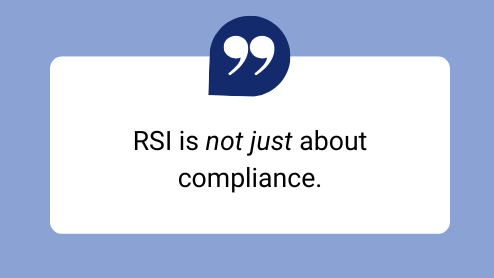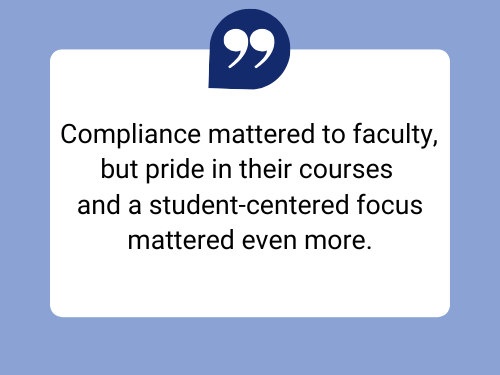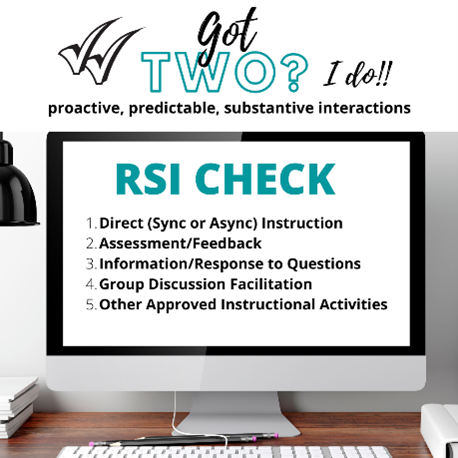Where’s the Beef? Having Fun Teaching and Ensuring Regular and Substantive Interaction
Published by: WCET | 2/28/2023
Tags: COVID-19, Distance Education, Faculty, Professional Development, Regular And Substantive Interaction
Published by: WCET | 2/28/2023
Tags: COVID-19, Distance Education, Faculty, Professional Development, Regular And Substantive Interaction
I know, I know, many of you are questioning the title of today’s post … “having fun?” plus “regular and substantive interaction” … what? But, as our authors will show you, it’s totally possible. And a great idea, for your students and entire institution. I’m so excited to introduce Sara Nafzgar and Carrie Patterson, both of Moreno Valley College, who join us today to highlight MVC’s perfect storm created by the COVID-19 pandemic colliding with the need to resolve compliance issues. Not only did they address the issues, but their entire digital learning culture shifted and, as you’ll see, they had fun doing it! Thank you to Sara and Carrie for this excellent post.
Enjoy the read,
Lindsey Downs, WCET

While everyone working in education had to weather the changes pummeled upon us in order to adapt to the impacts of COVID-19, Moreno Valley College (MVC) experienced (what we believe) a perfect storm. In addition to addressing the challenges of the quick shift to remote learning, during the summer of 2020, MVC was tasked with resolving a compliance issue concerning regular and substantive instructor-initiated interaction (RSI).
Amid globally turbulent times, in fewer than 18 months, administrators and faculty united as we shifted the culture by re-envisioning our distance education practices. The catchy campaigns and lessons learned by MVC can be helpful for any institution working to enhance its online education practices and ensure that courses align with federal standards.
Remember the perfect storm mentioned above? Well, here are the events that colluded to create such a quagmire. Remember, COVID-19 was reaching pandemic proportions in a similar timeframe.
The timeline hints at some of the challenges experienced, but the best parts of our story are the methods used, and lessons learned that were critical to our success.

RSI is not just about compliance. Admittedly, one reason faculty were so willing to participate in the improvement efforts was the looming follow up visit. Nobody wanted to be the reason that our college was not reaccredited. While this was a powerful motivator, even more persuasive was showing how RSI improves instruction and benefits both students and instructors. When the benefits of RSI were presented in entertaining and actionable ways, faculty were eager to engage. Compliance mattered to faculty, but pride in their courses and a student-centered focus mattered even more. In fact, once faculty fully understood the five forms of RSI, and that satisfying two of the five qualified as meeting the standard, most were not content with only meeting the basic requirement. They wanted to create high-quality courses that exceeded the standard.
In our review of over a hundred courses, we identified two potentially problematic patterns:
First: Some faculty were creating courses with a great deal of content, and they required students to do a great deal of work, yet, their courses would likely not meet the standard if they were selected for review. Their presence in the course was hard to find.
We used Wendy’s 1984 “Where’s the Beef” commercial as an analogy, explaining that the little old ladies are like our students and the course reviewers who want to find the beef, but sometimes we have developed our courses to be so bun-heavy that it can be difficult to locate. Additional training was titled “Beef or Bun.” This focused on distinguishing what was “beef,” and should be considered RSI by a reviewer, and what was “bun,” which would likely not be considered RSI. We defined bun as valued-added content that might be relevant and beneficial to a course but is not one of the five forms of RSI.

Second: We noticed that sometimes faculty were close to achieving RSI, and areas of their courses just needed some “beefing up.” To support faculty in fulfilling RSI requirements, we provided examples from our faculty to show what would and would not meet each form of RSI according to our guidelines. Discipline-specific examples from peers were powerful, and examples were not easy to find online.
We noticed that these two patterns could create confusion for students and reviews, so in addition to defining RSI, we taught a “Say this, not that” approach using clear language from the federal regulations. We called these “breadcrumbs” that made it simple to navigate a course, and also made RSI easy to spot and identify. Faculty were encouraged to include a communication plan on their homepages and in their welcome letters so that students would know what to expect regarding communication in the course.
As faculty found that RSI resulted in better student work and fewer student questions, they were hooked. Instead of asking “Where’s the beef?” during course reviews, the new slogan became “There’s the beef!”
We encourage you to find your own nomenclature to discuss RSI that makes it fun and reduces judgment when finding deficiencies, or feel free to borrow our Beef or Bun references.
So, what did the perfect storm teach us? Here are the three essential lessons we learned:
1. We can’t comply with what we don’t understand.
It is important that faculty both understand the requirements and know definitively whether they are meeting them. We widely distributed the district-wide guidelines to clarify the Department of Education definitions, and MVC developed supplementary resources. Another way that we simplified the intimidating topic was to conduct trainings titled “Just Tell Me What to Do” that focused on how to meet the standard at the most basic level.
The training taught the five forms of RSI and demonstrated how faculty could easily and consistently include two forms of RSI in their courses.
2. Varied Support is Key.
MVC and the Riverside Community College District (RCCD) provided deep financial and technical support that included instructional designers and a financial commitment to develop sustainable practices. The support of the institution and the expertise provided is critical to a strong Distance Education program. In addition to traditional DE outreach methods, a peer-to-peer support model that allowed faculty to assist faculty was well received.
We empowered a small team of faculty leaders to create a Canvas shell (we nicknamed it the DE Den) that became a vibrant space containing curated and created resources and synchronous and asynchronous trainings. In addition to providing resources, the DE Den became a place of community and a way to model RSI through the modules, announcements, meetings, etc. For many faculty who had never taken an online course, and now were expected to teach one, the DE Den was the experiential learning they needed.
Additionally, each faculty member was assigned a faculty “Sidekick” as their go-to person for support. The Sidekicks were marketed as peers who were not experts, but rather individuals who had distance education experience and enjoyed helping others find solutions. That lack of formal expertise greatly reduced the anxiety that is often coupled with needing technical assistance and opening a course for others to see. The Sidekicks received a special projects stipend in exchange for their fun, friendly, ongoing, intentional outreach, and that additional level of support was undoubtedly a key to our success.
3. The standard is to educate AND ensure.
Your institution might have strong training on RSI, but be prepared to answer the question, “How do you ensure your faculty are achieving it?” This is, perhaps, the most important lesson we learned.

To distinguish online education from correspondence education, institutions are required to ensure that interaction occurs. We provided a voluntary tool called the RSI Tracker Table that gave instructors a way to plan for and reflect upon the regular and substantive interactions in their courses. We launched a one-month campaign called “Got 2? I do!” and over one-third of all faculty voluntarily opened their courses for an RSI Check to validate their courses had monitoring and outreach, predictable patterns, and at least two regularly occurring types of substantive interactions. The transparent and frequent collaboration with Academic Senate, Faculty Association, and the Distance Education Committee led to the widely embraced annual random RSI Check policy that mimics the process used by accreditation visiting teams. When trust is established, and responsive support is available, faculty take ownership and everyone benefits.
Distance education requires a commitment to ongoing, continuous improvement, and this is not the last storm we will endure as educators. Thankfully, there are roadmaps that can act as a compass for those with work to do to teach and ensure RSI.
Beef or Bun?
Extra or Basic?
Hot or Not?
Call RSI whatever you like, but just make sure your courses have it. Beyond meeting a federal requirement for accreditation, our students deserve to have their instructor’s regular and substantive interactions throughout online courses. Because all bun is no fun!
Associate Professor, Communication Studies Accreditation Faculty Lead (MVC 18-21), Norco College
Distance Education Committee Chair, Moreno Valley College, Distance Education Co-Coordinator Moreno Valley Colleg